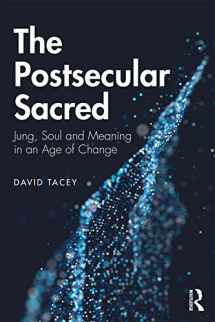
The Postsecular Sacred: Jung, Soul and Meaning in an Age of Change
ISBN-13:
9780367203221
ISBN-10:
0367203227
Edition:
1
Author:
David Tacey
Publication date:
2019
Publisher:
Routledge
Format:
Paperback
198 pages
Category:
Mental Health
FREE US shipping
on ALL non-marketplace orders
Rent
35 days
Due Jun 22, 2024
35 days
from $34.59
USD
Marketplace
from $50.74
USD
Marketplace offers
Seller
Condition
Note
Seller
Condition
Used - Good
Book details
ISBN-13:
9780367203221
ISBN-10:
0367203227
Edition:
1
Author:
David Tacey
Publication date:
2019
Publisher:
Routledge
Format:
Paperback
198 pages
Category:
Mental Health
Summary
The Postsecular Sacred: Jung, Soul and Meaning in an Age of Change (ISBN-13: 9780367203221 and ISBN-10: 0367203227), written by authors
David Tacey, was published by Routledge in 2019.
With an overall rating of 4.4 stars, it's a notable title among other
Mental Health
books. You can easily purchase or rent The Postsecular Sacred: Jung, Soul and Meaning in an Age of Change (Paperback) from BooksRun,
along with many other new and used
Mental Health
books
and textbooks.
And, if you're looking to sell your copy, our current buyback offer is $3.89.
Description
In The Postsecular Sacred: Jung, Soul and Meaning in an Age of Change, David Tacey presents a unique psychological study of the postsecular, adding a Jungian perspective to a debate shaped by sociology, philosophy and religious studies. In this interdisciplinary exploration, Tacey looks at the unexpected return of the sacred in Western societies, and how the sacred is changing our understanding of humanity and culture. Beginning with Jung’s belief that the psyche has never been secular, Tacey examines the new desire for spiritual experience and presents a logic of the unconscious to explain it. Tacey argues that what has fuelled the postsecular momentum is the awareness that something is missing, and the idea that this could be buried in the unconscious is dawning on sociologists and philosophers. While the instinct to connect to something greater is returning, Tacey shows that this need not imply that we are regressing to superstitions that science has rejected. The book explores indigenous spirituality in the context of the need to reanimate the world, not by going back to the past but by being inspired by it. There are chapters on ecopsychology and quantum physics, and, using Australia as a case study, the book also examines the resistance of secular societies to becoming postsecular. Approaching postsecularism through a Jungian perspective, Tacey argues that we should understand God in a manner that accords with the time, not go back to archaic, rejected images of divinity. The sacred is returning in an age of terrorism, and this is not without significance in terms of the ‘explosive’ impact of spirituality in our time. Innovative and relevant to the world we live in, this will be of great interest to academics and scholars of Jungian studies, anthropology, indigenous studies, philosophy, religious studies and sociology due to its transdisciplinary scope. It would also be a useful resource for analytical psychologists, Jungian analysts and psychotherapists.


We would LOVE it if you could help us and other readers by reviewing the book
Book review

Congratulations! We have received your book review.
{user}
{createdAt}
by {truncated_author}


